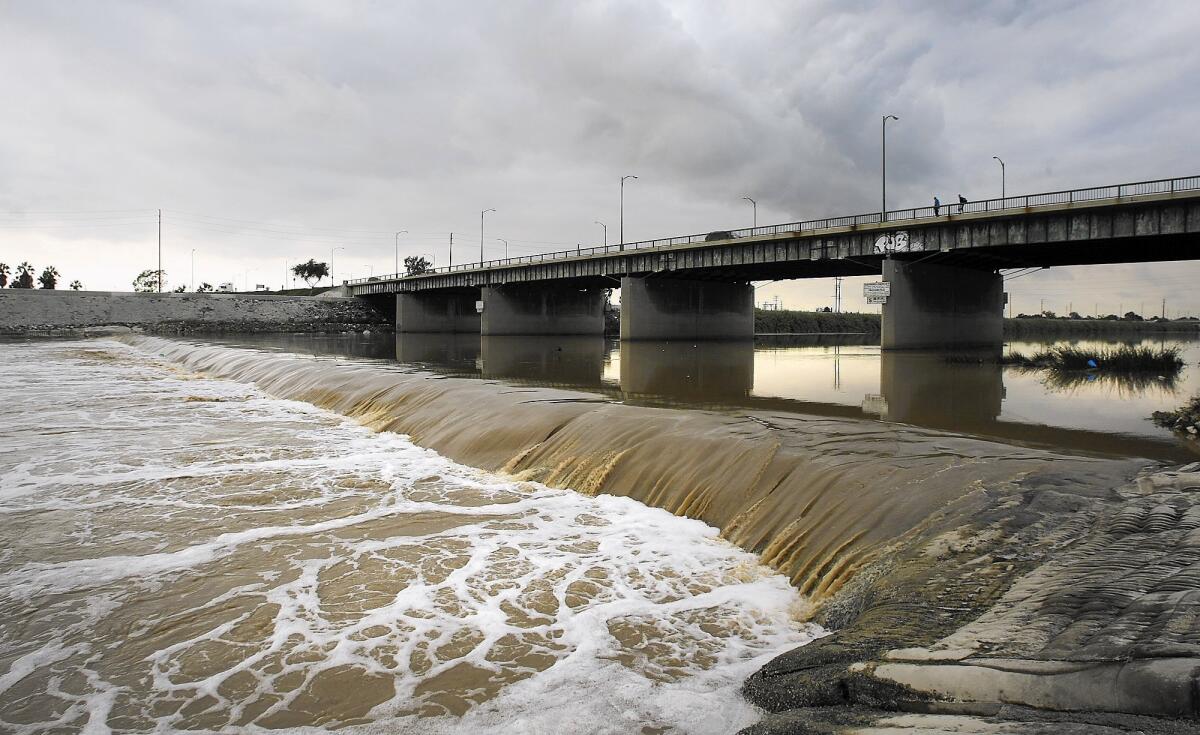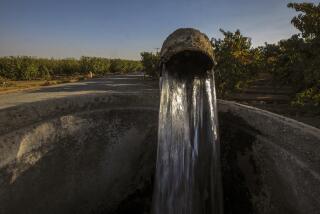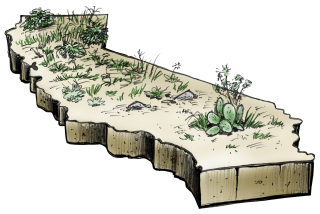Environmental group gives California mixed marks for drought management

The Los Angeles River flows under the Anaheim Street bridge in Long Beach.
More than four years into a drought, Californiaâs efforts to manage the crisis have produced mixed results, according to a report card issued Monday by a leading environmental nonprofit organization.
The state received high marks from the Natural Resources Defense Council for its urban conservation and water recycling but performed poorly in areas such as stormwater capture and restoring the San Francisco Bay Delta.
âThe state is making decent strides in some areas, while completely falling down on the job in others,â said Kate Poole, the report cardâs lead author and senior attorney for the councilâs water program. âThe bottom line is that we can take steps to create enough water for the residential, business and agricultural needs of California, while protecting the healthy environment that Californians deserve.â
The council used a point system to issue the state letter grades across five categories. Each category, they said, represents a strategy the state can use to âachieve a sustainable and drought-resilient water future.â The group gave California a B, B-minus, two Ds and an F.
Felicia Marcus, chairwoman of the State Water Resources Control Board, called the grades âa little disappointing.â
âWeâve done more in the past two or three years than we have in the past two or three decades on water in California,â she said. âItâs nothing to sneeze at.â
California got its highest mark in urban water conservation. Since June, people living in cities and towns across the state have cumulatively reduced their water usage more than 25% compared with 2013, meeting a requirement set by Gov. Jerry Brown.
The state received a B-minus for its efforts to recycle and reuse water. The report praised the state for increasing funding for water recycling and adopting regulations to help ensure that groundwater can be safely replenished with recycled water.
But the state got Ds for water conservation in the agricultural sector and for stormwater capture and reuse. It got its lowest grade â an F â for what the Natural Resources Defense Council said was poor management of the delta ecosystem.
âWeâre looking at how the state did and hoping this can serve as a sort of interim progress report,â Poole said. âIf my kids come home with two Ds and an F, theyâre going to be spending a lot more time on those subjects going forward. Thatâs what we hope the state will do here.â
Although agricultural water usage is about four times greater than urban use, the state âhas not set goals or mandatory requirementsâ for agricultural conservation, the report said, and has not enforced existing laws that could improve the savings.
Meanwhile, capturing runoff from storms could simultaneously increase water supply and reduce water pollution, the report said. The state is not on track to meet its stormwater capture goals, and the process of developing a long-term vision for stormwater management has been slow and short on specifics, according to the reportâs authors.
Marcus said many farmers have been âfeeling the brunt of the drought for ⦠years,â and would argue that the water board has been âhurling water at fish.â
State regulators âtotally agree with importance of stormwater,â Marcus added, but there is a disagreement over which âtacticsâ to use to improve the situation.
The council was most alarmed, though, by the condition of the San Francisco Bay Delta. It called the current proposal for two new water diversion tunnels âenvironmentally harmfulâ and pointed to the ongoing struggle of the delta smelt as an indicator of the watershedâs poor health.
âRather than taking steps to ease the impacts of the drought on the estuary and its imperiled fisheries, the state has repeatedly implemented actions during the drought that have made conditions worse,â the report said.
Marcus said she could not comment on some aspects of the criticism, such as the tunnels, because she reviews related appeals and permits. But she said âa lot of things are easier said than done.â
As for what grade she would give state water regulators, Marcus said: âIâd give us an A for effort and Iâd probably give us a B for the drought.... My grandmother would say never give yourself an A â itâs bad luck.â
Twitter: @bymattstevens
ALSO
Los Angeles Mayor Garcetti announces support for higher water rates
Everything we know about the San Bernardino terror attack investigation so far
L.A. lawmaker has âsticker shockâ over possible staffing costs for LAPD body cameras
More to Read
Sign up for Essential California
The most important California stories and recommendations in your inbox every morning.
You may occasionally receive promotional content from the Los Angeles Times.











